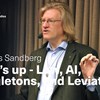instrumentally
A Paradox for the Intrinsic Value of Freedom of Choice
in Noûs, Volume 34:4 AbstractA standard liberal claim is that freedom of choice is not only instrumentally valuable but also intrinsically valuable, that is, valuable for its own sake. I argue that eac
Research seminar with Anders Sandberg: Serf’s Up: Law, AI, Singletons and Leviathan
Venue: Institutet för framtidsstudier, Holländargatan 13, StockholmRegister hereWelcome to this research seminar with Anders Sandberg, Ph.D. in computational neuroscience, researcher at IFFS and Senior

Anders Sandberg: Serf's up - Law, AI, Singletons and Leviathan
Research seminar with Anders Sandberg, Ph.D. in computational neuroscience, researcher at IFFS and Senior Research Fellow at the Future of Humanity Institute, Oxford University. Abstract A key problem
Children and the right to vote
In: Gheaus, Anca, Calder, Gideon, and De Wispelaere, Jurgen, eds. The Routledge Handbook of the Philosophy of Childhood and Children. Milton: Routledge. Introduction The history of democracy is stronglySixty years ago, no European democracy allowed 18-year-olds to vote; today, no European nation denies people aged 18 the vote. The tendency is to lower the age of voting further. Voting from the age of 16 is now allowed in several countries, including Austria, Argentina and Brazil. The general question raised by these developments concerns what the final destination should be: what is the appropriate voting-rights age in a democracy?
Resisting assimilation – ethnic boundary maintenance among Jews in Sweden
in: Distinktion: Journal of Social TheoryAbstractThis article evaluates Andreas Wimmer’s theory of ethnic boundary making by applying it to the maintenance of Jewish ethnic identification in Sweden, a
Rainer Bauböck: Globalization, new technologies and the future of democratic citizenship
Professor of Social and Political Theory, European University Institute. ABSTRACT Liberal democratic citizenship has been shaped by the legacies of Athens (democracy) and Rome (legal rights) but operate between individuals and states. In a Westphalian world, citizenship has both instrumental and identity value. Enhanced opportunities and interests in mobility rights strengthen instrumental interests in multiple citizenship among immigrants, among populations in less developed countries, and among wealthy elites. The latter two trends potentially undermine a genuine link norm and, if they prevail, might replace the Westphalian allocation of citizenship with a global market. New digital technologies create a second challenge to Westphalian citizenship. As has argued, digital identities could provide a global legal persona for all human beings independently of their nationality, and blockchain technologies could enable the formation of non-territorial political communities providing governance services to their members independently of states. Both the instrumental uses of citizenship for geographic mobility and technologies that create substitutes for territorial citizenship are not merely relevant as current trends. They are also advocated and defended normatively as responses to the global injustice of the birthright lottery. I will challenge this idea and argue that liberal democracies should not be conceived as voluntary associations whose membership is freely chosen, but as communities of destiny among people who have been thrown together by history and their circumstances of life. How these foundations of democratic community can be maintained in the context of rising mobility and the digital revolution remains an open question.
Sarah Fine: The outraged conscience of mankind: Asylum, refugees, and a human right to international freedom of movement.
Dr Sarah Fine, Lecturer in Philosophy, King's College London. Abstract Migration is a subject which generates intense debate and disagreement. For example, there is a great deal of debate about whether
Should Extinction Be Forever?
Should Extinction Be Forever?, Philosophy and Technology, First online: 17 october 2015 This article will explore a problem which is related to our moral obligations towards species. Although the re-cr, (6128), 32–33, ). This article will provide an argument in favour of re-creation based on normative considerations. The environmentalist community generally accepts that it is wrong to exterminate species, for reasons beyond any instrumental value these species may have. It is often also claimed that humanity has a collective responsibility to either preserve or at least to not exterminate species. These two beliefs are here assumed to be correct. The argument presented here departs from and places these two ideas in a deontological framework, from which it is argued that when humanity causes the extinction of a species, this is a moral transgression, entailing a residual obligation. Such an obligation implies a positive duty to mitigate any harm caused by our moral failure. In light of recent scientific progress in the field of genetic engineering, it will be argued that humanity has a prima facie obligation to re-create species whose extinction mankind may have caused, also known as de-extinction.
Environmental Co-governance, Legitimacy, and the Quest for Compliance: When and Why is Stakeholder Participation Desirable?
Journal of Environmental Policy and Planning, 18 (3), 306-323. Abstract Deliberative forms of stakeholder participation have been widely embraced as a key measure for addressing legitimacy deficits and








